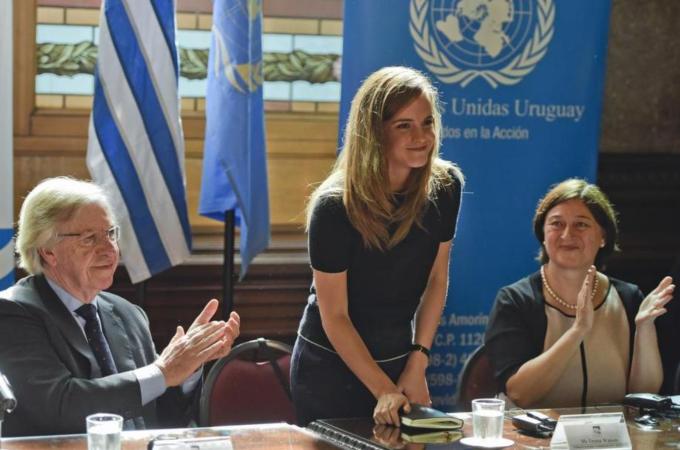Why Ema Watson Isn’t really Changing the Game
 “Emma Watson delivers Game-Changing Speech on Feminism for the UN” the social media has been blazed with this headline all past last week. “I want men to take up this mantle. So their daughters, sisters and mothers can be free from prejudice, but also so that their sons have permission to be vulnerable and human too — reclaim those parts of themselves they abandoned and in doing so be a more true and complete version of themselves,” said Emma Watson at the U.N. headquarters in New York City on Saturday. She was speaking as part of the‘HE-for-She’ global solidarity movement to promote women’s rights and equality between the sexes.
“Emma Watson delivers Game-Changing Speech on Feminism for the UN” the social media has been blazed with this headline all past last week. “I want men to take up this mantle. So their daughters, sisters and mothers can be free from prejudice, but also so that their sons have permission to be vulnerable and human too — reclaim those parts of themselves they abandoned and in doing so be a more true and complete version of themselves,” said Emma Watson at the U.N. headquarters in New York City on Saturday. She was speaking as part of the‘HE-for-She’ global solidarity movement to promote women’s rights and equality between the sexes.
Watch Full Video Here- https://www.youtube.com/watch?v=rymHYhlbBmw
While Emma’s speech is commendable and raises an important issue of collective responsibility by men in ending gender discrimination it would be an overstatement to call it game changing. In fact what would be worthwhile is to pause and reflect on the issues and concerns this particular episode has raised.
The issue that needs attention is the Gender Binary developed in this speech; This has been questioned by Babywasuin her blog “What about inclusion of people who merely do not exist within the gender binary – agender and genderqueer individuals – who are erased by the reduction of gender equality and feminism as a political ideology to ‘equality between men and women’?”
The point here we are trying to make is not to criticize Emma but unpack various other concerns that this episode unfolds. Babywasu concludes by saying “Emma Watson is wonderful for using her platform for good, but I hope that our (and international organizations’) celebrity [ambassador] obsession doesn’t cloud our hunger for gendered liberation. I’m still waiting for that game-changer.” For more read http://samoodzee.wordpress.com/2014/09/23/emma-watson-the-game-changer-the-paltry-standards-of-celebrity-feminism/
Ema’s speech suffers from several shortcomings and over-simplification ofgrave issues that the feminists and women’s movement has been grappling with for decades. However would it be correct to criticize a woman who has been wrongly placed in a system she is obviously not suited for,or is it time to question why the United Nations chose to use a “white, western, heterosexual, upper-class woman to speak for a group of united nations. Why should the mouthpiece of an international campaign be such a foreign, distant figure to so many girls and women?” As being rightly pointed by Julia Zulver in her opinion piece ‘Is Ema Watson the right woman for the Job?’ Read it the full article here http://www.aljazeera.com/indepth/opinion/2014/09/emma-watson-not-right-woman-job-20149245235239187.html#.VCOFd8qVesw.facebook
According to Julia “the United Nations is supposed to represent all people, particularly those without a voice. The organization is often criticised for being ineffectual, for not having any real “power” in the world. With that said, what it does have is an enormous reputation. When the UN speaks, people listen (whether or not they then take action is obviously another story). Why, then, did they choose Emma Watson to represent the new UN Women ‘HeForShe’ campaign?”
Emma Watson may not be brilliant feminists but her voice counts it therefore adds additional responsibility on the institutions to exercise extra caution and due diligence while appointing their ambassadors. We have all regards for Ms. Watson’s effort to raise such a critical issue but the point here is how the issue is being presented, in our over enthusiasm we need to be careful that our actions in no way undo’s the work done by the movements in the past. Our actions need to be a step forwards in words of Julia“For anyone who has ever attended a class even remotely related to gender, anything said in the speech was archaic… I would rather trust in the intelligence of the masses, and (simply and accessibly) talk not just about feminism as it relates to equal pay, but rather as a complex, reflexive, and discursive system of power structures with the ability to both oppress and liberate.”
We need to move away from the over-simplified version of gender discourse and have more dialogues on the issues of intersectionality and gender justice to bring in our debates the centrality of institutionalized power and patriarchy this would lead to real ‘Game-Change’!






